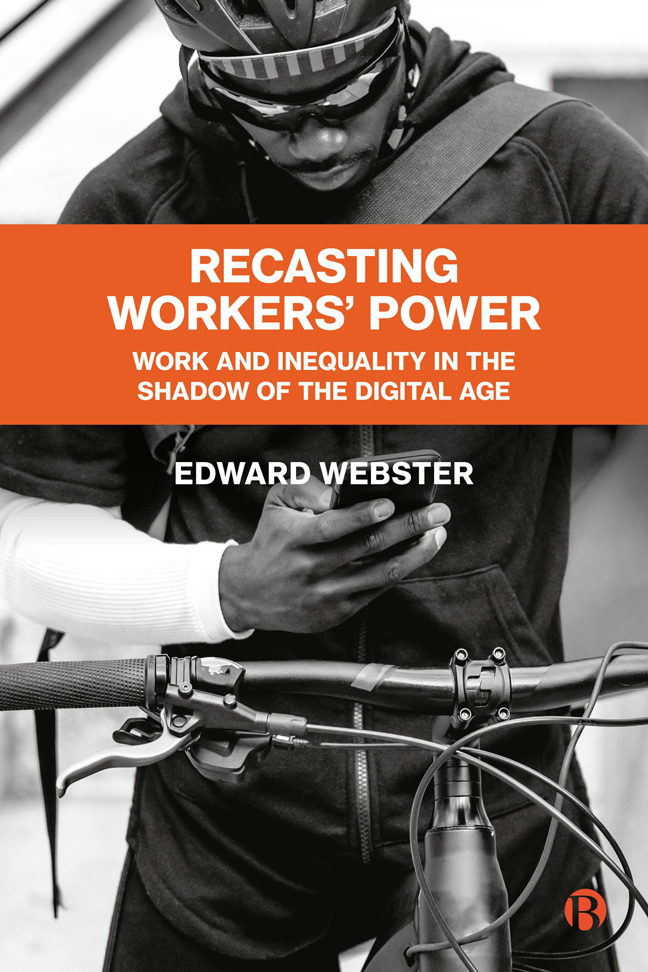Book contents
- Frontmatter
- Contents
- List of Figures and Tables
- List of Abbreviations
- Preface
- 1 The End of Labour? Rethinking the Labour Question in the Digital Age
- 2 Precarious Work after Apartheid: Experimenting with Alternative Forms of Representation in the Informal Sector
- 3 Neo-liberalism Comes to Johannesburg: Changing the Rules of the Game
- 4 Divided Workers, Divided Struggles: Entrenching Dualisation and the Struggle for Equalisation in South Africa's Manufacturing Sector
- 5 Authoritarian Algorithmic Management: The Double-edged Sword of the Gig Economies
- 6 Crossing the Divide: Informal Workers and Trade Unions
- 7 Global Capital, Global Labour: The Possibilities of Transnational Activism
- 8 Changing Sources of Power and the Future of Southern Labour
- Index
4 - Divided Workers, Divided Struggles: Entrenching Dualisation and the Struggle for Equalisation in South Africa's Manufacturing Sector
Published online by Cambridge University Press: 23 January 2024
- Frontmatter
- Contents
- List of Figures and Tables
- List of Abbreviations
- Preface
- 1 The End of Labour? Rethinking the Labour Question in the Digital Age
- 2 Precarious Work after Apartheid: Experimenting with Alternative Forms of Representation in the Informal Sector
- 3 Neo-liberalism Comes to Johannesburg: Changing the Rules of the Game
- 4 Divided Workers, Divided Struggles: Entrenching Dualisation and the Struggle for Equalisation in South Africa's Manufacturing Sector
- 5 Authoritarian Algorithmic Management: The Double-edged Sword of the Gig Economies
- 6 Crossing the Divide: Informal Workers and Trade Unions
- 7 Global Capital, Global Labour: The Possibilities of Transnational Activism
- 8 Changing Sources of Power and the Future of Southern Labour
- Index
Summary
Introduction
The growth of manufacturing industries in South Africa during the mid-1900s was central to the apartheid accumulation model of racial capitalism. After emerging as support sector for mining, a range of manufacturing industries established themselves at the centre of the Minerals Energy Complex (Fine and Rustomjee, 1996). By 1950, manufacturing overtook mining in its contribution to the country's GDP and continued to outstrip it for the rest of the century (Fine and Rustomjee, 1996: 72). Manufacturing grew by turning towards mass production, capitalising on the regime of cheap Black migrant labour that had developed on the mines a half-century earlier (Wolpe, 1972; Webster, 1985). Unskilled and semi-skilled Black workers would be brought together in large manufacturing workplaces, where they were highly exploited by white managers for the benefit of a white capitalist class.
As Webster (1985) initially identified, the contradictions inherent in the manufacturing labour process in that period laid the basis for Black workers to build power at the point of production, while the contradictions of the apartheid political economy generated struggle against it from the reproductive sphere of the townships and hostels. After a wave of strikes in the early 1970s that began in the manufacturing sector, an independent trade union movement was born. As it grew and began to bargain at industry level in the post-Wiehahn period, it won better conditions for Black workers. During this process, the social weight of the industrial working class grew and began to move beyond the factory to assert itself at the heart of the struggle against apartheid.
The manufacturing sector has declined in the post-apartheid period. In 2021, the sector contributed 11.7 per cent to the share of GDP, making it the fourth-largest sector in the economy behind trade, personal services and finance – finance contributed 23.5 per cent (Stats SA, 2021). The power of the trade unions in manufacturing and the social weight of this layer of the working class has mirrored the declining economic weight of the sector – 70.2 per cent of workers in manufacturing were union members in 1990, but by 2012 this figure was just 31.2 per cent (Macun, 2014: 44).
It is unsurprising that scholars and activists have often looked elsewhere in their efforts to build working-class power and search for a countermovement.
- Type
- Chapter
- Information
- Recasting Workers' PowerWork and Inequality in the Shadow of the Digital Age, pp. 72 - 100Publisher: Bristol University PressPrint publication year: 2023



